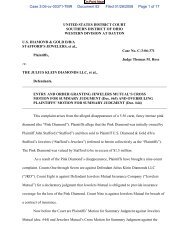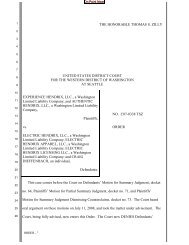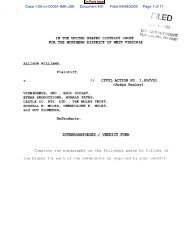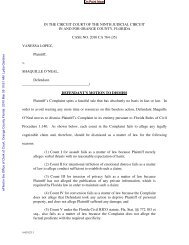GORDON KEENE VELLA. - On Point News
GORDON KEENE VELLA. - On Point News
GORDON KEENE VELLA. - On Point News
You also want an ePaper? Increase the reach of your titles
YUMPU automatically turns print PDFs into web optimized ePapers that Google loves.
THE MISREPRESENTATIONS AND MATERIAL OMISSIONS IN DR. BROWN’S<br />
TESTIMONY AND REPORT WARRANT RELIEF FROM THE JUDGMENT UNDER<br />
RULE 60(b) AND THE JUDGMENT SHOULD BE VACATED.<br />
There is no dispute that Dr. Brown’s testimony in the underlying trial was admissible<br />
only if it satisfied the requirements of Rule 702, and the cases construing that evidentiary<br />
standard – most particularly, Daubert and Kumho. See, e.g., Duffy v. Father Flanagan’s Boy’s<br />
Home, No. 8:03cv31, 2006 WL 308832, at *4 & n.4 (D. Neb. Jan. 26, 2006) (recognizing that<br />
admissibility of expert opinions regarding the reliability of the theory of “repressed memory”<br />
would be “subject to judicial screening” under Daubert). In particular, the opening portions of<br />
Dr. Brown’s testimony reveal lines of questioning by Plaintiff’s counsel clearly intended to<br />
address that standard of admissibility (i.e. qualifications, applicable error, general acceptance in<br />
the relevant scientific community, and peer-review). (See generally Tr. Vol. I.)<br />
In the context of expert testimony proffered under Rule of Evidence 702, district courts<br />
play a pivotal role of “gatekeeper” in determining whether to allow a jury even to hear the<br />
expert’s testimony. This “gatekeeper” function protects the jury from receiving at trial “expert”<br />
evidence that fails to meet required standards of reliability and relevance. Further, the Court’s<br />
role is critical because of the testimonial latitude granted to expert witnesses and to the<br />
imprimatur of credibility that such witnesses present to a jury. See Daubert, 509 U.S. at 595.<br />
Although not expressly set forth by the court in Vioxx, that court’s response to<br />
falsification of the testifying expert’s credentials indicates its keen awareness of the mantle of<br />
authority with which “expert” witnesses are generally bestowed.<br />
There also is no question that “there is disagreement among experts and courts regarding<br />
the validity and reliability of the phenomenon referred to as ‘repressed memory.’” Duffy, 2006<br />
WL 208832, at *4 n.4. (See also Barden Decl. 7 n.1 and decisions listed therein.) This Court<br />
- 8 -
















